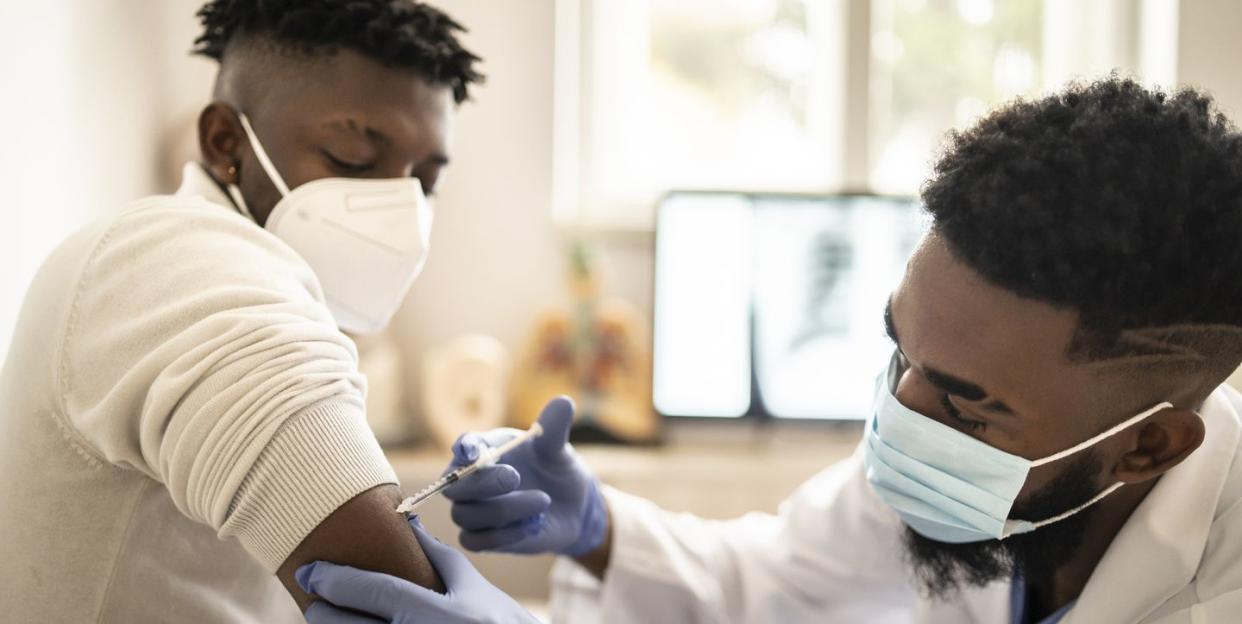You Don’t Need to Panic About the J&J Covid Vaccine Pause

Federal health officials called for a pause in the use of the Johnson & Johnson vaccine at federal sites starting today. This comes after a total of six women out of the roughly 7 million people who have been vaccinated so far developed a rare and severe blood clot issue.
At this time, the FDA and CDC are reviewing data to fully understand the events surrounding these blood clots to determine whether this pause is temporary or should be more permanent. “The time frame will depend obviously on what we learn in the next few days,” Janet Woodcock, MD, acting FDA Commissioner said in a media briefing today. Though, she noted, she expects this break to last only a few days.
Here’s what we know so far:
What’s the clotting issue?
It’s a rare type of blood clot called cerebral venous sinus thrombosis (CVST), that’s appearing in combination with low levels of blood platelets. The concern seems to be the occurrence of the CVST with the low platelet count together, which Peter Marks, MD, Ph.D., Director, FDA Center for Biologics Evaluation and Research said, “makes a pattern that is similar to Europe with another vaccine.”
While there isn’t a confirmed mechanism of action, it may have to do with the immune response that an individual generates that involves their own platelets or other parts of the system that make blood coagulate, explained Dr. Woodcock.
Who does this clotting issue tend to affect most?
It’s not clear right now exactly how to identify who might be most at risk for this. At the moment, all six cases have occurred in women ages 18 to 48. One woman has died and another is in critical condition.
How common is it?
The clotting issue is “extremely rare,” says Dr. Woodcock. Currently nearly seven million people in the United States have received the Johnson & Johnson vaccine; to date, six women have been identified as having this clotting disorder after the vaccination.
Should you panic if you’ve had the Johnson & Johnson vaccine?
Experts understand that people are concerned but stress that the clotting issue is extremely rare. Those who have developed it have done so between six and 13 days after receiving the one-dose shot.
“People who got the vaccine more than a month ago, the risk for them is very low at this time,” said Anne Schuchat, M.D., Principle Deputy Director, CDC, in the media briefing. For people who recently got the vaccine within the last couple of weeks, Dr. Schuchat says you want to be mindful of symptoms including severe headache, abdominal pain, leg pain or shortness of breath, and seek medical attention if you experience any of these issues.

Federal health agencies are looking to reschedule those currently awaiting Johnson & Johnson vaccines, but recommends those with appointments for Pfizer and Moderna to continue with their vaccinations. The Pfizer and Moderna vaccines are created in a different way (the J&J is a vector vaccine; the other two available in the U.S. are mRNA vaccines; find out more about all of the vaccines here).
The Advisory Committee on Immunization Practices (the same committee that recommended EUA for the vaccines used in the US) is scheduled to meet Wednesday to review the situation and any links between the vaccine and this disorder and recommend what should happen next, including whether the J&J vaccine should be limited to certain population groups.
You Might Also Like

